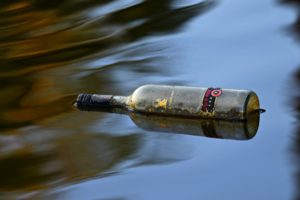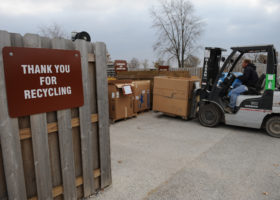How Long Does It Take for Glass to Decompose
Surely glass is biodegradable, right? I mean, glass is made from sand, so surely it would biodegrade.
Well, it might not be as simple as you think!
Is Glass Biodegradable?
Non-biodegradable materials like glass do not decompose quickly. In fact, glass bottles can stay intact in the environment for hundreds of years. It's thought glass bottles will never biodegrade, but they will break down slowly.
Here's the thing:
People get confused when it comes to glass; it's easy to think any natural material is biodegradable. That's not always the case, the glass may not be able to biodegrade, but it can degrade.
Just because a living substance can't break it down, doesn't mean other natural forces can't get the job done.
Physical forces can break it down.
For example:
- Wind
- Water
- Human influence
Considering they are the only factors that can break glass down, it's surprising it decomposes at all.
If it's not Biodegradable, then how long does it take to decompose? Will it be in our lifetime?
How Long Does Glass Take To Decompose?
I mentioned earlier that glass could decompose and it can, but it's not quick.
 Broken glass has been found dating back to 2000 B.C exist.
Broken glass has been found dating back to 2000 B.C exist.
That's the same time the Egyptians were alive!
The thing is, it wasn't designed to break down, unlike its biodegradable plastic friend.
The biodegradable plastic glass is designed to break down but often doesn't for many years.
The problem is 28% of glass bottles in the US never reach the processing plants, and this means millions of ton going to landfills every year.
Is Glass Bad For The Environment?
Twenty years ago, maybe, but now it's using less fuel in production and transporting than ever before. Good news for the planet.
Every six tons of glass recycled can reduce emissions by 1 ton, and the huge benefit is that it can be recycled endlessly into any product.
Great news for the planet! That means fewer emissions then you'd get from biodegradable plastics.
So, I know it's not biodegradable, but it is better for the environment than using plastic materials. The main advantage is that it doesn't leave toxins that could end up in our food.
Not only is it better than biodegradable plastics, but it more environmentally friendly than paper (see our is paper biodegradable article) as it uses no chemicals when being produced.
Is there any material more eco-friendly?
Of course, there is, but it beats biodegradable plastics and paper materials hands down.
How Do I Recycle Glass?
Recycling is an excellent way of keeping glass out of the growing mounds of waste we create. Recycled Glass can be continually reused, making countless amounts of bottles.
 The green glass is usually made with around 70% re-purposed materials. But how do you recycle it correctly?
The green glass is usually made with around 70% re-purposed materials. But how do you recycle it correctly?
Most trash services offer a collection service for recycled materials. If there isn't one close, you could always go to a recycling plant your self.
For your health, be careful not to break the glass, it can be dangerous!
To finish it off, no, it's not biodegradable. But, it is a lot better than biodegradable plastic!
If you like our content, don't forget to comment below, or subscribe to our Twitter account to find out more about the biodegradable business.
Frequently Asked questions
Is Glass Eco-Friendly?
Glass is eco-friendly, to a certain extent. Recycled glass can be both impermeable and food-safe. Most glass products are made using recycled glass due to the environmentally friendly benefits.
Is Glass Worse Than Plastic?
Glass is not worse than plastic, but it does have it's downsides. To start with glass is heavier than plastic, which means more emissions are used when transporting glass. This means glass also costs more than plastic.
Is It OK To Recycle Broken Glass?
No, broken glass cannot be recycled. It's down to it being a hazard for the workers. You should dispose of broken glass by wrapping it paper and placing it in the trash.
How Long Does It Take for Glass to Decompose
Source: https://ecofreek.com/biodegradable/is-glass-biodegradable/